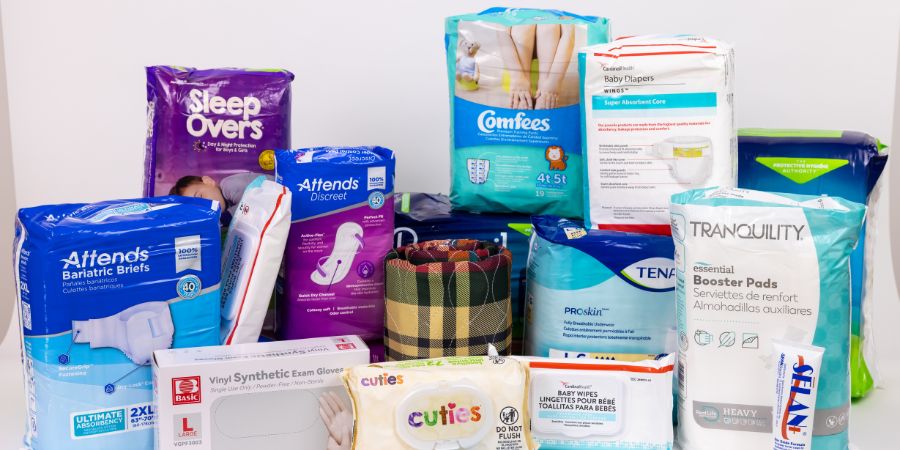Jesse identified as a young adult with autism long before he fully identified as a person with incontinence. Growing up, he tried to mask the symptoms of his bowel control condition, embarrassed of having to focus his life around getting to the restroom before an accident occurred.
"I had chronic constipation throughout my childhood, along with teachers in school that made me feel bad for having accidents that were based on my basic human need to go," said Jesse.
It wasn't until he successfully graduated high school that Jesse realized a crucial part of self-acceptance: "Everyone has different needs, and those needs may not always be understood by everyone."
Growing Up With Incontinence
Incontinence is a condition that causes an individual to lose control of their bladder and / or bowels. It's common among older adults and those with disabilities. For Jesse, incontinence correlated with autism, a prevalent comorbidity in individuals with autism. However, accepting that one has a bladder and bowel control condition is difficult for many people with incontinence– especially teens and young adults.
Attending school for hours while managing the symptoms that come with incontinence is an incredibly challenging feat. Entering the workforce as a teenager or young adult with incontinence is also difficult.
Check Your Eligibility
2 Easy Steps
From catheters to pediatric and adult incontinence supplies, discover the continence care essentials covered by your insurance.
School and work require individuals to abide by specific parameters, like using the restroom a set number of times, being in front of classmates and coworkers with no privacy, and fighting bodily urges to void the bladder and bowels. Each set of rules in the workplace and school add to the stress that comes with trying to manage incontinence in these situations.
Figuring out how to use the bathroom when he needed to was one of the most upsetting aspects of school for Jesse. His school allowed each student a limited number of restroom breaks per quarter. Their explanation– like many other schools'-- was that the limit prepared students for an appropriate workplace environment. But for Jesse, this rule was impossible to follow.
"As someone with bowel control issues, it felt like a nightmare."


Lacking Incontinence Resources
Jesse's struggle to manage his incontinence symptoms was exacerbated by the fact that he lacked adequate access to the protective products he required to stay comfortable and hygienic. He said there were many times he had accidents and wished he had the proper supplies, like adult briefs or pull-ons, to keep himself dry. "I felt stressed out and embarrassed. At one point in middle school, I tried wearing a Depend pull-up and ended up feeling socially isolated and alone, nearly leaking from wearing the wrong size." Following this occurrence, Jesse was bullied by his peers about his condition.
"I couldn't understand why everyone was bullying me with the 'I'm a big kid now' commercial jingle."
Jesse’s school administration also said that using incontinence products was “inappropriate.” Because of this, he was eventually removed from participating in certain classes and activities.
Like thousands of individuals with incontinence, Jesse continued to manage his condition without knowledge of or access to proper continence care resources. Even though his school district knew he was receiving Medicaid services, he wasn't made aware that his insurance could cover the cost of his incontinence supplies.
Whether it was the school's lack of knowledge or his own, the consequence of not having incontinence products weighed heavily on Jesse and still affects how he views that period of his life today.
"Knowing now that I could have had incontinence products added to my IEP and could have had accommodation for supplies in the nurse's office makes me feel like I didn't have the opportunity to be honest and accepting of my condition. No one gave me that choice."


To Jesse and many other young adults with bladder and bowel control conditions, incontinence felt like something he had to suppress and hide while coping with the stress of managing the condition.
High school was a slightly better experience for Jesse. He had a class for social skills strategies where he learned with other students with autism and other similar challenges. The classroom had an accessible restroom. Jesse felt it was beneficial that he could still be in mainstream classes and feel supported and treated with respect if he needed help.
Finding Answers
After high school, Jesse found a healthcare provider who helped him understand his incontinence and didn't shame him for his condition, which he had experienced so many times before.
"I wasn't made to feel embarrassed, and I finally felt like I was treated with respect."
Researching online, Jesse found the incontinence resources he was looking for. He also began managing his incontinence by using the free products he received through his Medicaid plan and Aeroflow Urology.
"Finding Aeroflow Urology made it easier to order my products online, adding my insurance and doctor's information easily."
With Aeroflow Urology, Jesse now receives a proper supply of medical-grade adult products that fit him correctly and protect him from accidents, leaving him feeling confident and independent. "If I can keep the same great access to the protection I have now, I feel like I'll have the confidence to be ready for anything," he said. Jesse has also joined the Aeroflow Urology Adult's Facebook group and has begun following the Aeroflow Urology Instagram account, where he receives helpful information about his condition and can share his feelings and experiences with a community of other individuals with incontinence.
Follow Us On Instagram
Advocating for Inclusion With Aeroflow Urology
Today, Jesse is accepting of his autism and his incontinence. He no longer feels ashamed of what he can't control. He advocates for inclusion for all people with incontinence, and is now Aeroflow Urology's first Patient Advocacy Expert. Jesse uses this platform to share his personal stories with Aeroflow's audience, hoping to make an impact and to encourage those with incontinence to speak openly without shame. He also hopes to break the stigma that surrounds incontinence and wants to directly communicate that incontinence is a common human experience that shouldn't be suppressed or hidden away.
"As a young adult, I don't want to be seen only for my disability, but also for the skills and value I can bring when helping people."
Disclaimer
Information provided on the Aeroflow Urology blog is not intended as a substitute for medical advice or care from a healthcare professional. Aeroflow recommends consulting your healthcare provider if you are experiencing medical issues relating to incontinence.












